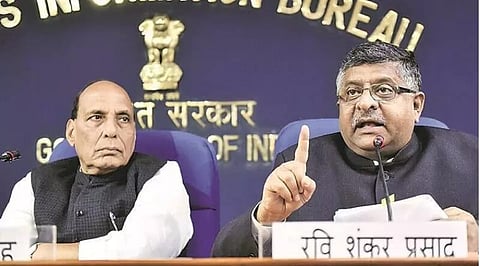
- Home
- Live Blog
- Breaking News
- Top Headlines
- Cities
- NE News
- Sentinel Media
- Sports
- Education
- Jobs

The BJP-led government at the Centre has done well by constituting a high-level committee on implementation of the vital Clause 6 of the Assam Accord. Though a committee was constituted earlier too, it had literally collapsed as most of the persons nominated to it had withdrawn from it in the wake of massive protests that were triggered off by the government’s move to pass the controversial Citizenship (Amendment) Bill in January this year. This time round a new set of eminent persons from various walks of life has been nominated to the committee; their mandate is to suggest to the government various constitutional, legislative and administrative measures that would safeguard the interests and identity of the indigenous communities of Assam. Clause 6 of the Assam Accord, signed way back in August 1985, had read thus – “Constitutional, legislative and administrative safeguards, as may be appropriate, shall be provided to protect, preserve and promote the cultural, social, linguistic identity and heritage of the Assamese people.” While successive governments both at the Centre and in the State must be squarely blamed for continuously ignoring the vital provisions of Clause 6, there are certain forces which have only relentlessly tried to misinterpret certain words of this clause with the sole intention of scuttling all efforts to implement the Assam Accord. The people of Assam have seen how a section of political parties have always tried to create a confusion over the words “Assamese people” as contained in the text of Clause 6, by questioning who “Assamese people” exactly were. While an attempt was made by Pranab Gogoi, a former Speaker of the Assam Assembly – who incidentally belonged to the Congress party – to put to rest all controversies and confusion over defining who the word “Assamese” denoted, the Congress government then in office refused to accept it and give it legitimacy. One reported reason at that point of time was an ego-clash between the then Speaker and the then Chief Minister. The other reason could be a clear unwillingness on the part of the then government in office to resolve the issue and start implementation of this vital clause. For those trying to create a confusion, and for those who have remained confused, the plain simple meaning of the words “Assamese people” at that moment of history was the indigenous communities of the state. There is no denying the fact that large-scale and unabated influx of ‘land-hungry’ people from erstwhile East Pakistan and present-day Bangladesh has affected each and every indigenous community of Assam. This can be gauged from the fact that the Bodo community is today in reality numerically weaker in Kokrajhar Lok Sabha constituency in comparison to the immigrant Muslim population of East Pakistan/Bangladesh origin. Same is the status of the Rabha community in Goalpara district. Given this ground reality that the illegal migrants have posed a massive threat to all indigenous communities of Assam, the government should have included at least one member from one of the indigenous tribal communities, so that the constitutional, legislative and administrative safeguards, which will be suggested and/or recommended by the newly-constituted high-level expert committee covers and benefits all the indigenous tribal communities living in Assam. Another word of caution at this juncture – The All Assam Students’ Union and all other organizations that are serious about protection of all the indigenous communities of Assam should come forward to extend full support and cooperation to this high-level expert committee and provide it with various suggestions, so that the final recommendations become acceptable to all the indigenous communities of Assam. Additionally, all the other Indian communities who are not indigenous to Assam but have been living in the state should also extend full support to this expert committee. The reason is simple and clear – all Indian people living in Assam should stand united against the illegal migrants and their protectors and help save Assam from being converted into an extension of Bangladesh. One must remember what Zulfiqar Ali Bhutto, a former Prime Minister of Pakistan, had written the failure to get Assam included in East Pakistan in 1947 remained a source of abiding resentment in that country. Zulfikar Ali Bhutto in his book titled ‘Myths of Independence' had clearly written – “It would be wrong to think that Kashmir is the only dispute that divides India and Pakistan, though undoubtedly the most significant. One at least is nearly as important as the Kashmir dispute, that of Assam and some districts of India adjacent to East Pakistan. To these Pakistan has very good claims.”